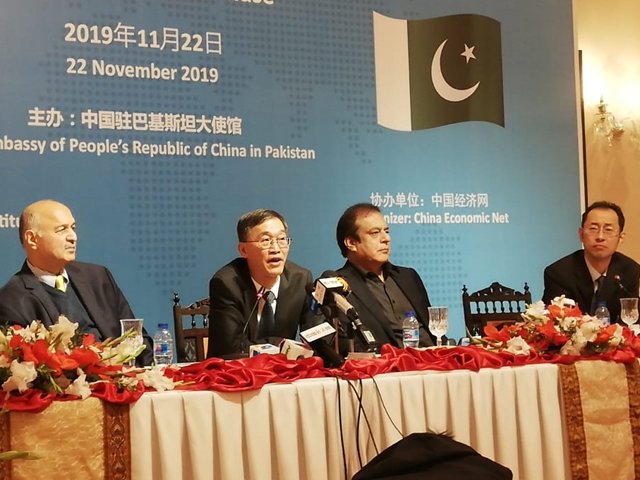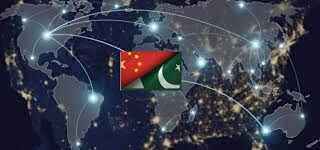
- 91 % of Pakistani debt owed to west, only 9% to China; says Mushahid Hussain
- Five journalists awarded CPEC Awards
ISLAMABAD – Chinese Ambassador Yao Jing Friday came down hard over the aspersions cast by US Assistant Secretary of State Alice Wells over the multi-billion-dollar China, Pakistan Economic Corridor (CPEC), saying that the out of the context comments from US reflected its ignorance about the Pakistan, China relations and the CPEC.
Addressing the inaugural ceremony of 5th CPEC Media Forum jointly hosted by the Embassy of People’s Republic of China in Pakistan, Pakistan-China Institute and China Economic Net, Yao Jing said CPEC had fulfilled Pakistan’s energy needs, providing 30 percent of the total electricity generation in Pakistan, providing energy security for the country’s economic development.
“If the US is really concerned about the lack of electricity in Pakistan, why didn’t the US companies come to build power stations before 2014,” Yao Jing said, taking a dig at the US Assistant Secretary of State Ms Alice Wells who criticized CPEC recently.
Ambassador Yao Jing said he was ‘shocked and surprised’ at the Alice Wells’ remarks over CPEC which ‘fully exposed’ her ignorance of Pakistan China relations.
He said CPEC projects have been fully investigated by both Chinese and Pakistani sides and the unanimous conclusion is that “CPEC is clean and transparent”.
“Why United States didn’t come to rescue Pakistan by investing in power sector in 2013. We welcome American investments in Pakistan and we don’t have problem with it. But the US should not cause aspersions over something they don’t have accurate information on,” said Ambassador Yao Jing.

He said 75,000 Pakistanis are directly employed in CPEC projects while there are 200,000 indirect beneficiaries and over 100 local Pakistani companies are involved in CPEC projects, which will generate 2.3 million jobs till 2030 and contribute 2-2.5% to Pakistan’s GDP.
Talking about the smear about CPEC by Ms. Alice Wells, Yao Jing said the economic and social benefits the CPEC has brought to Pakistan over the past six years are obvious to all.
“The completed energy projects in the corridor provide nearly 30% of the total electricity generation in Pakistan, providing energy security for the country’s economic development. If the US is really concerned about the lack of electricity in Pakistan, why didn’t the US companies come to build power stations before 2014,” he said.
He said the CPEC has brought tangible economic and social benefits to Pakistan since its construction in more than six years, which is widely recognized. The generating capacity of the completed energy projects of CPEC account for nearly 30 percent of Pakistan’s total power generation.
“These projects have provided the energy security for Pakistan’s economic development. The Havelian-Mansehra section of Karakorum Highway (KKH) II opened to traffic just in Nov 18, and it resolves the trip problem along KKH,” he added.
Yao Jing said amid the construction of CPEC, Pakistan is ranked 108 in the ease of doing business from 136 in 2018, according to the latest World Bank annual ratings.
“Pakistan takes the 82th place from the 108th on global competitiveness index. All these make great opportunities for attracting foreign investment and realizing industrial upgrading. Regarding the issue of high electricity prices, Pakistan had a serious power shortage before 2014. The average power outage was 6-12 hours per day, and the cost was as high as 17 cents/kWh. Everyone here has a deep understanding,” he said.
He said in order to reduce power generation cost and solve the power shortage problem, the Pakistani government issued the 2014 Upfront Tariff Policy for imported coal power plant in 2014 to attract investment in Pakistan’s energy sector.
“The policy is open and transparent and applies to both local and foreign investors. However, this policy has not attracted foreign investment including the United States. In order to support Pakistan, Chinese government approved of Powerchina and Huaneng Group’s investments in Pakistan under the CPEC framework in 2015,” he added.
He said facts have proved that China has provided the Pakistani people with cheap and clean energy and has won unanimous support from Pakistani people of all walks of life.
“The people of China and Pakistan are the most qualified to evaluate the corridor. If the United States really cares about the power shortage in Pakistan, why there have been no American companies coming to Pakistan to build power plants before 2014,” he said.
Yao Jing said the groundless speculation that so called M5 motorway was involved in bidding corruption is totally ridiculous, and extremely irresponsible.
“PKM project is the largest transportation infrastructure project conducted under the framework of China-Pakistan Economic Corridor (CPEC). The governments of both China and Pakistan attach great importance to it. In 2013, China State Construction Engineering Corporation (CSCEC) and the Pakistani government signed a Memorandum of Understanding (MOU), which envisaged a motorway linking Karachi to Lahore. Both sides expressed the intention of cooperation at that time. However, there is no legal binding or enforcement on this MOU,” he added.
He said the validity lasted only one year and it had expired on July 4, 2014 and in June 2015, PKM project officially launched the bidding process.
“Through fair bidding, China State Construction Engineering Corporation (CSCEC) won the bid at the lowest price. The entire process is open and transparent and is in line with international practice and laws and regulations of Pakistan. All the operations of the project are in full compliance with the laws and regulations of Pakistan and can withstand any challenge and investigation,” he added.
Yao Jing said as for the cost, the actual cost of this project is slightly higher than that of the ordinary motorway is completely reasonable and normal, because the project is located next to Indus River, which caused high flood control design standards and more bridges.

“Meanwhile, long distance engineering materials transportation and higher pavement roughness index are also the main reason. As to the ML-1 project, the initial design of the project was jointly accomplished by the China Railway No 2 Bureau, NESPAK, and PRACS. The project was launched in 2016, and the initial design was submitted in May 2017. In April, 2019, it has successfully passed the initial design review, organized by PR, of the complex including MMP (Mott McDonald Pakistan), Canarail (from Canada) and the Crimson,” he added.
As the project has not yet been approved, the amounts of the project will be adjusted according to the actual condition and the needs of Pakistan. After finalizing the project, we would initiate bidding in accordance with international practice which is business practice.
Touching on labor and employment, Yao said that since the construction of the CPEC, more than 75,000 jobs have been created directly for the Pakistani people, with its per capita income increased by 23 percent. He said more than 100 small and medium-sized enterprises have participated in the construction of the CPEC, providing hundreds of thousands of jobs.
Among which, the transport infrastructure project Sukkur-Multan Motorway has created about 29,000 local jobs, and a large number of Pakistani technicians have been trained during its construction.
“In particular, more and more Pakistani women are finding jobs under the CPEC construction and participating in social life. The project is expected to create 2.3 million jobs between 2015 and 2030 and boost the Pakistan’s annual economic growth rate by 2-2.5 percent, according to the Pakistani government,” he said.
Senator Mushahid Hussain in his welcome address said that Pakistan China relations and the success of CPEC “rankles many” both in the region as well as outside the region.
“Hence while they cannot stop or slow the project, now they are trying to undermine it through negative propaganda. It is ironical that on one hand, US is opposing the Belt and Road Initiative (BRI) as well as CPEC but on the other hand, the US is taking steps to have a ‘copycat project’ through the recently passed BUILD ACT and the newly established International Development Finance Cooperation, which has outlay in infrastructure and other areas of $60 billion,” he added.
Talking about the so-called debt trap, Senator Mushahid Hussain said 91 percent of the Pakistani debt is owed to the west, including multilateral institutions and only 9% to China. He also said that US should focus on Facts rather than peddling the Indian narrative on CPEC, which has no foundation whatsoever.
Senator Mushahid Hussain said that it was amazing that allegations of corruption were being repeated based merely on media speculations while no government authorities found evidence of any kind of corruption in CPEC projects.
Senator Shibli Faraz thanked the contributions of Pakistan-China Institute and reaffirmed the commitment of government of Pakistan to promotion and preservation of CPEC and taking it forward to next stage which will reap big dividends for the nation.
Prominent members of the Chinese Media delegation of 10 members headed by Mr. Cui Jun, Editor in Chief of China Economic Net (CEN), also spoke and talked of the partnership between CEN and PCI to promote Media cooperation between two sides. The media delegation included Ms. Meng Yu Hong, Vice Editor in Chief, Global Times.
Syed Fakhar Imam presided over the afternoon session where he thanked China for his support on the Kashmir Issue, also referred to the reforms and opening up policy of Deng Xiaoping particularly focus on education and he underlined need for a University on Science and Technology and institute of agriculture with Chinese funding in Pakistan.
Senator Mushahid introduced book on CPEC by prominent journalist Saleem Safi, which was presented to the Chinese delegation, while Mian Abrar introduced his new magazine, DiploMag as the first China focused publication in Pakistan.
Special awards were given to journalists for their contributions in strengthening CPEC and China Pakistan relations.








